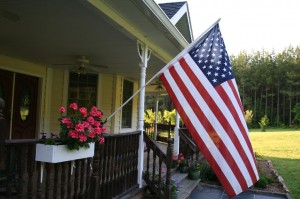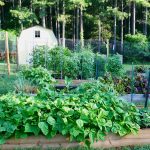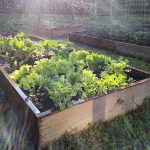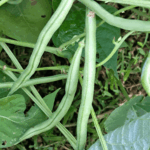 |
| Fourth of July and watering the garden go together! |
This month’s task list for the garden is now available on Seven Oaks! You can download and print out your copy from our site. All you need is Adobe Acrobat.
During July, pay particular attention to watering. Watering the vegetable garden adequately is essential to grow great vegetables. July here at Seven Oaks is hot, hot and humid, with a little more hot thrown in for good measure. Temperatures can soar above 90 and even past 100. Plants need a lot of water when they’re stressed by heat. I suggest watering window boxes, pots and containers daily, sometimes twice a day depending on how dry they get during the hottest days of July.
For vegetable gardens, I’m sold on soaker hoses. Soaker hoses or drip irrigation uses a long, flat hose with tiny pinpricks along its flat sides to slowly and constantly drip moisture into the ground near the plants’ roots. Instead of spraying water onto the leaves and onto the grass around your flower or vegetable beds, the water is dripped exactly where it’s needed. That’s critical to preventing both water waste and to ensuring adequate watering of your vegetables and flowers.
Another good investment for the serious gardener is a rain gauge. Sure you can use an old cat food or tuna can, but rain gauges are inexpensive. I think I paid about $2 for mine at the local hardware store and it’s a simple clear plastic tube with inch, half inch and quarter inch indications painted on the sides. It mounted in a green plastic bracket on the fence around my vegetable garden. It’s a reliable way to measure how much rain your garden is actually receiving. I’m often surprised at how much rain a thunderstorm can generate or an overnight shower; it seems to rain for only a few minutes, but the gauge will show a half inch or more. A good rule of thumb is to supplement nature’s watering schedule (rain) with watering the garden when it receives an inch or less each week. For vegetable gardens, you might want to water a bit more, if you can.
Using mulch in the garden not only keeps weeds at bay, it also prevents moisture loss through evaporation. I prefer natural mulch products such as hardwood mulches near my flower beds. I don’t mulch my vegetable garden, preferring instead to plant vegetables so closely together that they naturally retain water.
Another trick to making sure your garden receives adequate water during the hot summer months is to channel rainwater from the roof gutters into the garden. We ran PVC pipes from the gutter spouts down into the ground and about a foot below ground. The water runs downhill, away from the house, and into one of the flower beds and to a peach tree we planted in the yard. Even on days when the garden receives only a little bit of rain, the excess water flows into that garden bed, giving my tree a nice drink. You can use rain barrels to collect rooftop water.
Ready to download the July tip sheet? Grab it here or on our resources page. July Garden Tips.




